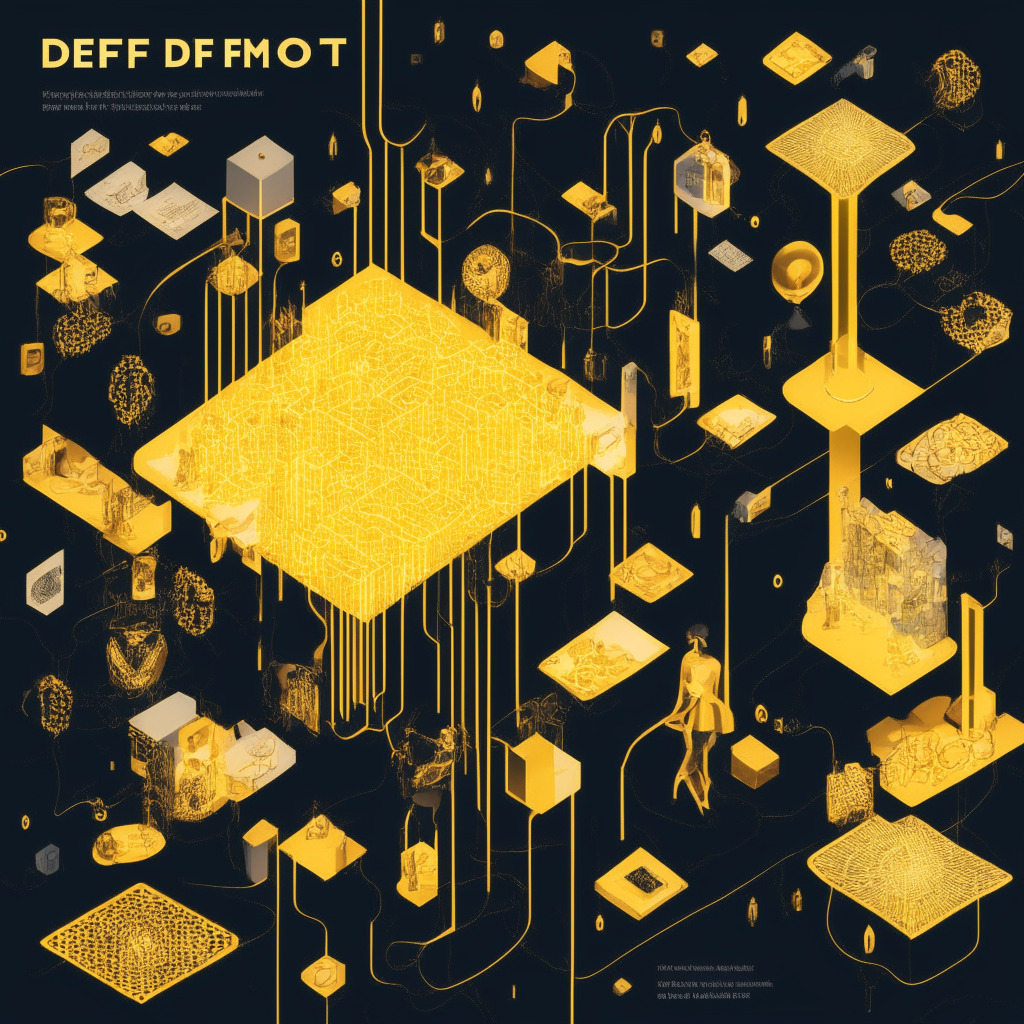“EmotiCoin experienced a massive increase due to the Reverse Split protocol – an innovative deflationary mechanism reducing supply by 20% every 4 hours. Meanwhile, traders await the CEX listing of Wall Street Memes, potentially the biggest meme coin launch of 2023, made more attractive by its staking mechanism offering 282% APY.”
Search Results for: Origin Protocol
The Fall of Glass Protocol: Lessons learned from Video NFTs in the Crypto Bear Market
The failure of crypto venture Glass Protocol, which aimed to create a platform for trading video NFTs, highlights a bleak scenario in the NFT space amid a bear market. Despite the potential for greater earnings and blockchain transparency, demand for these unique NFTs has been disappointingly low.
OriginTrail: Leading the Age of Decentralized Knowledge Graphs with AI & Blockchain
“OriginTrail aims to build a ‘trusted knowledge foundation’ via a Decentralized Knowledge Graph (DKG) to counter AI-induced distortions or supply chain fraud. Leveraging blockchain technology, this multi-chain protocol allows users to create ‘knowledge assets’ and extract value from them.”
Ethereum-Based Ethscriptions Protocol Hit Hard by Exploit: A Lesson in Blockchain Vulnerability
The newly launched protocol Ethscriptions experienced a major setback with significant losses due to an exploit in its main marketplace, leading to a loss of 202 Ethereum assets across 123 addresses, according to its inventor Tom Lehman. The issue came from a poorly written code, allowing unauthorized withdrawal of Ethscriptions from the marketplace.
Bitcoin’s Fee Spike and Ordinals Protocol: Innovation or System Abuse?
The Bitcoin network’s transaction fees have surged due to the new “Ordinals” protocol, enabling non-fungible tokens and other applications. This has led to debates among developers regarding its impact on the network’s functionality, congestion, and the balance between innovation and transaction moderation.
Evaluating Origin Ether: Rapid Growth vs Sustainability in Yield Farming
Origin Ether (OETH), a new yield farming app, has rapidly gained over $12 million in total value locked (TVL) in just 14 days. Utilizing liquid staking and DeFi protocols, OETH allows users to earn rewards from multiple sources. However, potential investors should cautiously evaluate its long-term sustainability due to the speed of its expansion.
Boosting Rewards with Origin Ether: The Future of Yield-Farming in a Crowded DeFi Market
Origin Protocol plans to issue Origin Ether (OETH), an ether derivative enabling holders to earn yields by staking ether on other protocols, stacking rewards on top of native staking yields. OETH offers access to DeFi’s highest yields without typical yield-farming hassles and gas fees. However, the crowded staking derivatives market presents challenges for OETH’s growth.
Navigating the Crypto Sphere: Market Fluctuations, Rising Interest in Ethereum, and the Cosmos Crisis
“The cryptocurrency market is undergoing changes, fluctuating with Bitcoin seeing reduced volatility rates that may prelude significant price swings. Interest in Ethereum’s ZkSync Era is rising, and despite economic uncertainties, new legislations and developments highlight the continuously evolving crypto landscape.”
Federal Interest Rate Hike and the Surprising Ignition of Cryptocurrency Markets
Cryptocurrency prices, including Bitcoin and Ethereum, have welcomed the anticipated interest rate increase by the U.S. Federal Reserve. Bitcoin experienced a 0.8% surge while Ethereum saw a 0.5% rise. According to Lex Sokolin of Generative Ventures, crypto’s overall story remains unaffected despite macroeconomic events. Equity markets show mixed responses, but further rate hikes might occur.
Ether ETFs: A Real Possibility or Just Publicity Stunts? Analyzing SEC’s Stance on Approval
The fate of not-yet-filed ether funds depends on the SEC’s treatment of the latest wave of spot bitcoin ETF filings. A bitcoin ETF approval might encourage fund issuers to try ether next, while regulatory clarity could increase ether ETF’s chances in the future.
The Splintering of FloorDAO: Activist Investors and the Battle for Crypto Governance
Crypto group FloorDAO, devoted to NFT finance, has split into two factions due to disagreements. One splinter group, FloorkDAO, transferred over $2.5 million from FloorDAO’s treasury and initiated a redemption process for FLOOR tokens. This split highlights increasing influence of activist investors in DAOs.
The Intricate Web of Illicit Fentanyl Trade Powered by Cryptocurrency
The U.S Treasury’s Office of Foreign Assets Control (OFAC) has targeted several cryptocurrency wallets involved in the illicit trade of fentanyl. Most transactions were conducted via Stablecoins on Ethereum and Tron networks. These wallets, save for one, were hosted on a centralized crypto exchange, allowing the illicit flow of hundreds of thousands of dollars worth of cryptocurrency.
Unwrapping the Mystery: The Power and Pitfalls of Wrapped Tokens in Blockchain
‘Wrapped’ crypto tokens are cryptocurrencies linked to another coin or asset, often native to a certain blockchain. They allow for cross-chain interoperability and decentralised finance applications, enhancing liquidity and accessibility. However, they also raise centralisation risks, potential security issues and regulatory uncertainties.
Unpacking Project Atlas: A Centralized Perspective on Decentralized Markets
‘Project Atlas’, pioneered by Bank of International Settlements and various European Central banks, is developing a proof of concept system tracking on-chain and off-chain cryptocurrency transactions. The project aims to understand macroeconomic relevance of cryptocurrency markets and decentralized finance, offering transparency and potential risk mitigation.
Scaling Into the Land of the Rising Sun: Arbitrum Foundation and Fracton Ventures Set to Conquer Japan
“Arbitrum Foundation, a supporter of the Ethereum Layer 2 network, is partnering with Fracton Ventures to tap into the Japanese market. The alliance will focus on ecosystem construction and furnish community education, promoting Arbitrum’s adoption by Japanese developers and investors.”
Innovative Incentives or Short-Term Opportunism? Trader Joe’s Ambitious Proposal for Arbitrum DAO
Trader Joe, a leading decentralized exchange operating on the Avalanche blockchain, aims to strengthen its liquidity through a 1.83 million ARB grant from Arbitrum DAO. The DEX intends to contribute to the growth of the Arbitrum ecosystem using its innovative Market Making Incentives Program and Auto-Pool product. Implementing this strategy, Trader Joe will promote development and innovation within the Arbitrum ecosystem, fostering community-first relationships.
Unraveling the Paxos Mystery: Missteps, Controversy, and the $500,000 BTC Fee Conundrum
Paxos, a US-based crypto service provider, made an odd transaction, sending $200 worth of BTC but tagging an astounding fee around $500,000 due to a bug. This incident drew attention to the unpredictability of digital currencies and triggered discussion on improved safety protocols.
Ethereum’s New Holesky Testnet: A Step Towards Optimized Network Scalability and Enhanced Testing
Ethereum is set to unveil a new testnet, Holesky, which promises larger capacity than its existing networks, Sepolia and Goerli. The new testnet aims to address potential scaling issues and accommodate more extensive testing for Ethereum’s growing developer community. Named after a Prague train station, Holesky’s significant size would provide a realistic environment for infrastructure and core protocol upgrade testing, targeting to enhance Ethereum’s resilience against unexpected obstacles.
Exorbitant Bitcoin Transaction Fees: A Costly Mistake or a Deep-Seated Flaw?
A $200 Bitcoin transaction incurred a whopping fee of nearly $500,000, sparking a debate among crypto enthusiasts. Some hypothesize a money laundering plot, but others believe a faulty digital payment platform may be to blame. This incident highlights the pressing need for secure, efficient transaction processing to avoid such costly blunders in the future.
Unraveling the Regulatory and Ethical Quagmires: Navigating through the Crypto Landscape
A U.S. federal judge delayed a sentencing hearing for radio host Ian Freeman, who allegedly created an illegal Bitcoin exchange used by scammers. Meanwhile, the DeFi Education Fund contests a patent claim by tech company True Return Systems. Also, DigiFT’s dETH0924 provides up to 4% APR, boosting Ethereum’s PoS mechanism, while crypto infrastructure provider Qredo integrated Circle’s USDC stablecoin into its wallet.
PayPal’s Crypto Integration and Binance’s Noble Deed: A Deep Dive into Pros, Cons & Verifiable Progress
“PayPal’s new feature allows U.S. users to convert cryptocurrencies to USD. However, this poses questions due to transaction costs, potential incompatibility with MetaMask, and Bitcoin transactions. Meanwhile, Binance’s generous disaster relief pledge raises issues regarding beneficiary verification.”
Exploring OpenSea: Transforming Digital Asset Ownership Through NFTs and Facing Challenges
OpenSea, a decentralized marketplace for nonfungible tokens (NFTs), is revolutionizing the digital ownership economy. However, its reliance on cryptocurrency and possible exposure to fraudulent NFT listings are potential drawbacks. Despite these limitations, OpenSea continues to transform our interaction with digital assets.
Balancing Act: Ethereum’s Quest for Privacy, Regulation, and Decentralization with Privacy Pools
Ethereum’s co-founder, Vitalik Buterin, leads a privacy protocol initiative, ‘Privacy Pools,’ employing zero-knowledge proofs to verify user funds legitimacy, preserving transactional privacy. The protocol aims to create a separation that filters out funds related to criminal activities, harmoniously balancing financial privacy and regulation.
Balancing Financial Regulation and On-Chain Privacy with Zero-Knowledge Proofs
Ethereum co-founder, Vitalik Buterin, proposes the use of zero-knowledge proofs (ZK-proofs) for ensuring financial compliance and privacy in the blockchain world. This method can verify claim affirmations without divulging all transaction details, thus balancing anonymity and accountability. However, acceptance and successful execution within the blockchain community and regulatory bodies will determine the viability of this potential revolution in blockchain technology.
Unraveling Blockchain: Introducing Privacy Pools for Enhanced Security and Compliance
Vitalik Buterin and his co-authors introduced novel “privacy pools” in blockchain, addressing privacy issues and crime associated with privacy mixers. These pools utilize zero-knowledge technology to separate honest transactions from unlawful activities, encouraging transparency and honesty in this digitally decentralized environment. The future of blockchain looks promising yet challenging with regard to privacy and regulatory compliance.
Anoma Foundation’s Privacy-Prioritized Blockchain: Breaking New Ground or Stirring Trouble?
Anoma Foundation is advancing with privacy-focused blockchains by creating a standalone blockchain for Namada protocol. Namada, founded by Awa Sun Yin, features zero-knowledge cryptography, facilitating private transactions across Ethereum or Cosmos networks. It can embed privacy features in any digital asset and decentralized apps without altering their original code.
Crypto Exchanges and Bitcoin: A New Strategy or a Conflict of Interest?
Bitfinex, a renowned crypto exchange, is reportedly keeping Bitcoin on its balance sheet, potentially converting a portion of trading fees into the cryptocurrency. This strategic move indicates an endorsement of Bitcoin’s long-term value and shows strong belief in cryptocurrencies. However, concerns have been raised over potential market sway and fairness issues.
Rise of Bitcoin Derivative Coins amidst Shaky Crypto Market: A Focus on Bitcoin BSC
‘Bitcoin BSC’, a stake-to-earn model ‘Bitcoin clone’ derivative coin makes a striking entry, despite fluctuations in the crypto market. This efficient and scalable proof-of-stake protocol exhibits lower transaction costs and builds on BNB Smart Chain, offering potential substantial upside for early investors.
Chronicle’s Leap Forward: Lower Gas Fees, More Networks and Integrity Questions Unanswered
“Chronicle, the second-largest oracle provider, is set to expand its services to other networks, thereby introducing more competition to the oracle landscape. The Chronicle Protocol aims to reduce gas fees by 60% envisioning higher platform utilization and maintaining uncompromised data integrity with data origin monitoring user dashboards.”
Ethereum’s Co-founder Sells Remaining Stake in MakerDAO: A Signal for Blockchain’s Future?
Ethereum co-founder, Vitalik Buterin, recently traded his remaining stake in MakerDAO tokens after MakerDAO’s co-founder announced plans to reimplement the project on a new blockchain, NewChain. The move shows shifting alliances and notable developments in blockchain dynamics.
Court Ruling Throws Crypto Sphere into Disarray: ETH and BTC as Commodity vs Security
A New York district court dismissed a lawsuit against Uniswap, ruling that BTC and ETH are commodities, not securities. The court defended the decentralized nature of Uniswap, stating the investors’ claims would be better addressed to Congress, not the court. This ruling may influence future lawsuits against decentralized protocols.
The Evolution of Total Value Locked (TVL) in DeFi: The Impact of Tokenized Real-World Assets
As decentralized finance or DeFi matures, the concept of total value locked (TVL), which represents the amount of money in a specific protocol, now includes tokenized real-world assets (RWAs), broadening understanding of on-chain assets. RWAs, including private equity, mortgages, and illiquid funds, are now incorporated within this framework, making DeFi more appealing to large-scale investors. However, limited availability of segmented and classified RWA TVL data remains a challenge.































